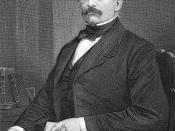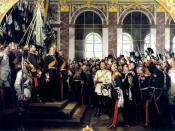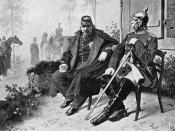It is traditionally seen that Otto Von Bismarck was largely responsible for the unification of Germany and that he used a plan of war & diplomacy to fool the other European powers. But this achievement is too quickly attributed too the success of Bismarck. While Bismarck's superb diplomatic skills were a crucial factor in the unification of Germany, he would not have achieved unification without the feeling of nationalism that had already spread throughout Germany. In fact, rather than a master diplomat, Bismarck was probably an expert opportunist, who took advantage of situations as they arose & occasionally being lucky. He reacted to others' actions as much as he initiated events himself. Some historians are of the opinion that Bismarck's motive was not the desire to unite Germany at all. L.C.D. Seaman wrote about on interpretation that Bismarck unified Germany, "He did not. He did not even want to."
As well as that the empire he created was not even a German empire, as Bismarck had never intended for it to be a German empire.
The progression that led to the unification of the German states began long before the arrival of Bismarck. This process started during the Napoleonic wars. Napoleon unwittingly sparked a feeling of nationalism throughout Europe. He had not only united the people of Germany and Italy. German nationalism was anti-French in origin. These feelings intensified and were nurtured, eventually spreading from the youth to the new middle class. The Crimean War reinforced these feelings and the German people looked towards Prussia as a leading power in Germany for salvation. Therefore we can see that not only Bismarck was responsible for the unification of the German states but also the people who longed for a unified Germany. These events, which were totally unrelated to Bismarck, show...


